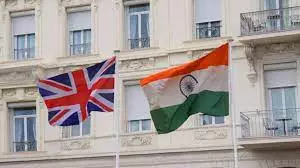
India-UK free trade agreements at an impasse in the final stages
text_fieldsLondon: The India-UK free trade agreement negotiations are at a standstill in its final stages. Both governments were aiming to complete the draft by Diwali.
The Department for International Trade (DIT) clarified that the deal will only happen if it meets with the UK's interests. UK Trade Secretary Kemi Badenoch said last week that the country cannot do more later just because there may be an FTA struck with India. A UK government spokesperson stated: "We remain clear that we won't sacrifice quality for speed and will only sign when we have a deal that meets the UK's interests."
Two of the major issues are data localisation and UK companies being allowed to bid for Indian government contracts. A report in The Daily Telegraph said the likelihood of a so-called "thin" trade deal within the symbolic Diwali or October 24 deadline and further "iterative" deals at a later stage is now looking like a likely outcome.
A source told the UK media that the stumbling blocks are absolutely to do with digital. "How ambitious and comprehensive this deal is is in some way a function of time." Regarding the controversial interventions over a wide-ranging bilateral trade agreement, strategic experts say the dispute may end up in a diluted trade pact.
Last week, UK Home Secretary Suella Braverman expressed reservations over India being offered some sort of open borders visa concessions. India responded by saying that a Migration and Mobility Partnership (MMP) between the two countries had not "worked very well" in tackling visa overstayers.
Rahul Roy-Chaudhury, Senior Fellow for South Asia at the London-based International Institute for Strategic Studies (IISS) think tank, said the prospective UK-India FTA under the Liz Truss government will not be as substantive nor as comprehensive as envisaged by the previous Boris Johnson government. "The negotiations on key issues of mobility/migration and tariffs can be expected to continue towards a non-time bound second-phase of the agreement."
"Negotiations on key issues of mobility/migration and tariffs can be expected to continue towards a non-time bound for the second phase of the agreement. But, it will still enable both governments to claim political victory, even though its economic impact may be underwhelming for both," he added.
The focus of the free trade agreement is to lower trade barriers, cut tariffs, and support easier imports/exports.






















